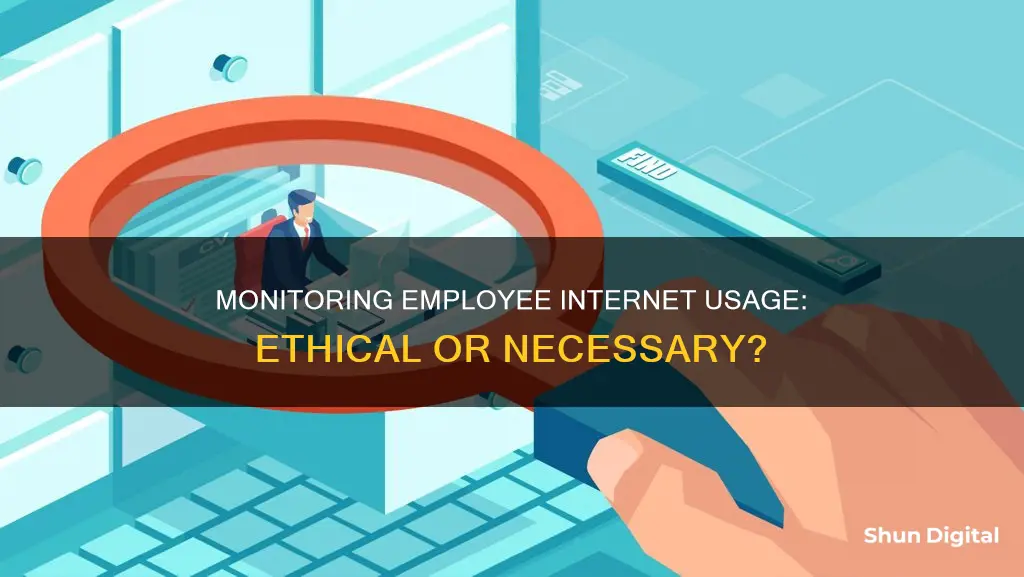
In today's world, the internet is integral to most businesses. However, it also presents challenges, such as cyber security risks and reduced employee productivity. This has led to a rise in employee monitoring, with many employers tracking their staff's internet usage. While this can help improve productivity and accountability, it also raises ethical questions about privacy and trust. Some employees may feel that monitoring is an invasion of their personal space and a violation of their privacy. On the other hand, employers argue that it is necessary to protect company resources and prevent liability issues. So, what are the boundaries of acceptable monitoring, and how can it be done in a way that balances employee privacy with company interests?
What You'll Learn

Increased productivity
Monitoring employees' internet usage can lead to increased productivity for several reasons. Firstly, when employees are aware that their internet usage is being observed, they are more likely to stay focused on their tasks and avoid time-wasting activities. This awareness can act as a deterrent, encouraging employees to make better use of their time and increase their output.
Additionally, monitoring tools can block or restrict access to unproductive websites and applications. By limiting these potential distractions, employees are automatically guided towards more productive activities, further enhancing their productivity.
According to a report by the Engagement Institute, US companies lose $550 billion annually due to decreased productivity, with internet usage being the top-cited time-wasting activity. This highlights the significant impact that monitoring employees' internet usage can have on improving productivity and reducing financial losses for businesses.
Furthermore, monitoring tools can provide valuable insights into how employees are utilising their work hours. Employers can identify which employees are taking excessive breaks, experiencing extended periods of inactivity, or taking too long to complete tasks. This information enables better accountability and allows employers to step in and provide support or guidance where needed.
By implementing employee monitoring, businesses can improve time management, increase focus on task completion, and ultimately boost overall productivity.
Monitoring Power Usage: Strategies for Energy-Efficient Businesses
You may want to see also

More accountability
Monitoring employees' internet usage can lead to more accountability. An employee monitoring tool can provide powerful insights into how staff are using their work hours. For example, it can show whether they are accessing non-work-related websites and apps during work time, and how they are spending their workday. This can help employers identify employees who are taking too many breaks, or too long to complete tasks. This way, there is a clear sense of accountability in the organisation, and employers can easily step in when needed.
However, it is important to note that the laws regarding staff monitoring vary from country to country. While employee monitoring is legal in the US, some states strictly prohibit monitoring without the employee's consent. Similarly, if an employer has employees working from the EU, they will be subject to the EU's GDPR rules, which are stricter than the employee privacy laws in the US.
Additionally, there are other laws, such as the US Electronic Communications Privacy Act, that regulate what information can be monitored by an employer. Employers must also consider employee privacy when monitoring internet usage and are limited by other privacy laws, including the Health Insurance Portability and Accountability Act (HIPAA) and the Children's Online Privacy Protection Act (COPPA).
To avoid legal issues, employers should have an honest and open internet use policy. They should explain their monitoring policy and how it is implemented, as well as tell their workers which sites are restricted and why. This can help to avoid employees feeling like their privacy has been violated, which can affect their morale and productivity.
Monitoring Home Electricity Usage: A UK Guide
You may want to see also

Fewer security risks
Monitoring employees' internet usage can help protect companies from security risks. With employees using company devices and networks at home and in the office, unmonitored internet use increases security risks, impacts productivity and compromises company resources.
Unmonitored internet access can lead to serious operational concerns and reduce employee performance. For example, an employee constantly checking social media during work hours interferes with their focus and takes time away from the task at hand. This leads to tasks taking much longer than necessary and wasting company time.
Additionally, malware, viruses and data breaches can occur through harmful downloads, compromised websites and phishing attacks. An employee downloading unauthorised software could unintentionally install spyware that steals company data. An unmonitored and poorly trained employee could fall victim to an email phishing scam that compromises workplace systems.
Robust user activity monitoring tools can help identify security risks before they become an issue. Monitoring can ensure that staff don't access illegal or dangerous websites and apps that could compromise company security. It can also help keep track of who is accessing what data and for how long. For example, monitoring can flag up if someone is spending too much time on sensitive business data.
If something does go wrong, monitoring reports can help identify which employee was responsible and get down to solving the problem.
Monitoring Firestick Usage: A Step-by-Step Guide for Parents
You may want to see also

Employee privacy laws
Federal laws such as the Electronic Communications Privacy Act of 1986 (ECPA) and the Stored Communications Act (SCA) allow employers to monitor employee communications and activities on company-owned devices. The ECPA permits monitoring of company systems and devices, while the SCA allows employers to review files and data created by employees during work hours. However, the ECPA also prohibits wiretapping or intercepting calls without consent, and the Computer Fraud and Abuse Act (CFAA) prohibits accessing an employee's device without permission.
State laws can provide additional privacy protections for employees. For example, the California Consumer Privacy Act (CCPA) grants employees the right to request details of private information collected by their employer. Some states have also enacted "`lifestyle discrimination`" statutes, preventing employers from discriminating based on employees' off-duty actions. Additionally, states like Connecticut, Delaware, Texas, and New York have data protection laws that require employers to notify employees about monitoring software.
While there may be legal consequences for violating employee privacy, employees' privacy rights in the workplace are generally limited. Employers have broad rights to monitor workplace communications and devices, especially those owned by the company. As such, employees should not expect substantial privacy rights when using company technology, even when working from home.
Monitoring Bandwidth Usage on Your iPad: A Step-by-Step Guide
You may want to see also

Protecting company resources
The internet is a vital part of the modern business world. However, it is a double-edged sword that can bring about significant benefits and severe risks. It is essential for employers to monitor their employees' internet usage to protect their company's resources and avoid potential liabilities.
Employee Productivity
Monitoring employee internet usage is crucial in ensuring that workers are not wasting time on non-work-related activities. According to a report by the Engagement Institute, lost productivity costs US companies around $550 billion annually, with internet use being the top time-wasting activity. By monitoring employees, employers can increase productivity and ensure that their staff is focused on their assigned tasks.
Intellectual Property Protection
Employees who conduct research online may be tempted to plagiarize content or violate copyright laws. Monitoring their internet usage can help employers ensure that their workers know how to handle sensitive materials properly, thus protecting the company from potential legal action.
Hostile Work Environment
Monitoring can also help prevent the creation of a hostile work environment. Even if employees are not accessing inappropriate content, they may still cross a line in how they use the internet. Displaying crude content, off-color jokes, or discriminatory language can lead to sexual harassment claims and cause significant damage to the company's reputation.
Breach of Confidentiality
Employee computers are often connected to secure systems and intranets, where passing documents is generally not an issue. However, moving sensitive data onto the internet can be catastrophic. Monitoring can help ensure that employees do not accidentally or intentionally compromise confidential information.
Security Risks
Monitoring employees' online activity can also protect the company from security risks. Cybercriminals can exploit unmonitored activity to plant malware in unprotected computers. By monitoring employees' internet usage, employers can reduce the likelihood of such attacks and protect their company's assets and employees.
Monitoring App Resource Usage: A Comprehensive Guide
You may want to see also
Frequently asked questions
Yes, it is legal for employers to monitor internet usage, especially if it is done on a company-owned device. However, there are laws that protect employee privacy, such as the Electronic Communications Privacy Act (ECPA) and the Health Insurance Portability and Accountability Act (HIPAA).
Monitoring employees' internet usage can increase productivity, improve accountability, and reduce security risks. It can also help protect the company from legal action and liability issues.
Monitoring employees' internet usage can lead to morale and trust issues if it is done covertly or without consent. It can also be seen as an invasion of privacy and may be illegal in certain states or countries, such as in the EU, where it would be subject to GDPR rules.







